
It is with profound sadness that we inform you of the passing of Dr. Eric Nathaniel James, Assistant Professor of the University of Hartford, and a graduate of the Skeletal Biology and Regeneration Area of Concentration in the Biomedical Science Ph.D. program at UConn Health.
Dr. James earned his Bachelors of Science from Stillman College in Tuscaloosa, Alabama. He then joined the Professional Science Master’s Program at the University of Connecticut, followed by the Graduate Certificate Program at UConn Health, under the mentorship of Dr. Marja Hurley. He later went on to join the Institute for Regenerative Engineering as a graduate student in 2010. Dr. James displayed a strong passion for teaching and pursued a career in research combining genetics and regenerative engineering. In collaboration with Dr. Anne Delany’s laboratory, he focused his thesis work on nanostructured scaffolds for microRNA-mediated bone regeneration. He graduated with his Ph.D. in 2015, and performed a post-doctoral fellowship at Tufts University. During that time, he also served as an adjunct professor of Newbury College and Quinnipiac University. In 2018, Dr. James joined the University of Hartford as an Assistant Professor in the Department of Civil, Environmental and Biomedical Engineering.
Dr. James was a kind, thoughtful and beloved member of our group, who had a tremendous passion for teaching and research. He touched the lives of many through his sustained commitment to mentoring, elevating others, and paying it forward. Throughout his career, he was particularly involved in mentoring at risk underrepresented minority students. Dr. James’ commitment to helping others is his everlasting legacy. He will be greatly missed, but never forgotten.
By Dr. Lakshmi Nair


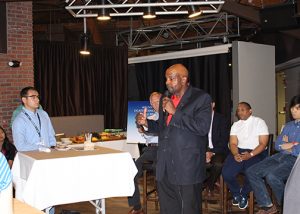 By Cato T. Laurencin, M.D., Ph.D.
By Cato T. Laurencin, M.D., Ph.D.

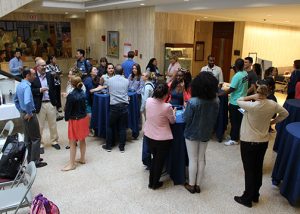





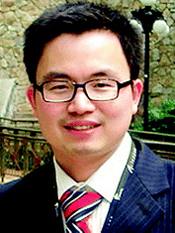 Dr. Meng Deng received a B.S. in Chemical Engineering in 2004 from the very prestigious Tsinghua University in Beijing and his Ph.D. in Chemical Engineering in 2010 from the University of Virginia, Charlottesville, VA. He completed his doctoral thesis in biomaterials and tissue engineering under my mentorship at the University of Virginia. His Ph.D. project was focused on the design and development of novel biomaterials and matrices for bone regeneration based on a highly versatile platform of biocompatible polyphosphazene blends. He also worked on developing mechanically competent bioresorbable nanostructured three-dimensional biomimetic scaffolds for accelerated bone healing. Meng was an extraordinary Ph.D. Student and received He was the recipient of the Special Recognition Award for Academic Achievement from the Department of Chemical Engineering, and the Outstanding Doctoral Dissertation Award for the Department of Chemical Engineering from the University of Virginia. In 2008, the People’s Republic China awarded Dr. Deng the China Government Award for Outstanding Students Abroad. After completing his Ph.D. in 2010 he has been a Postdoctoral Fellow working on regenerative engineering of complex musculoskeletal tissues using integrated graft systems under my guidance in the Institute for Regenerative Engineering at the University of Connecticut Health Center. His research interests include biomaterials, drug delivery, nanotechnology, and regenerative engineering.
Dr. Meng Deng received a B.S. in Chemical Engineering in 2004 from the very prestigious Tsinghua University in Beijing and his Ph.D. in Chemical Engineering in 2010 from the University of Virginia, Charlottesville, VA. He completed his doctoral thesis in biomaterials and tissue engineering under my mentorship at the University of Virginia. His Ph.D. project was focused on the design and development of novel biomaterials and matrices for bone regeneration based on a highly versatile platform of biocompatible polyphosphazene blends. He also worked on developing mechanically competent bioresorbable nanostructured three-dimensional biomimetic scaffolds for accelerated bone healing. Meng was an extraordinary Ph.D. Student and received He was the recipient of the Special Recognition Award for Academic Achievement from the Department of Chemical Engineering, and the Outstanding Doctoral Dissertation Award for the Department of Chemical Engineering from the University of Virginia. In 2008, the People’s Republic China awarded Dr. Deng the China Government Award for Outstanding Students Abroad. After completing his Ph.D. in 2010 he has been a Postdoctoral Fellow working on regenerative engineering of complex musculoskeletal tissues using integrated graft systems under my guidance in the Institute for Regenerative Engineering at the University of Connecticut Health Center. His research interests include biomaterials, drug delivery, nanotechnology, and regenerative engineering. Dr. Deng is an outstanding researcher in the institute. He has published more than 20 research articles in high impact journals like Biomaterials, Advanced Functional Materials, and the Proceedings of the National Academy of Sciences. His research work has been highlighted on journal covers several times. He was also recognized for his research work. For instance, in 2010, he received STAR award from the Society for Biomaterials in Seattle, WA. Last month, he won a Young Scientist Award from the World Biomaterials Congress 2012 and traveled to Chengdu China to receive this great honor. As a mentor for Dr. Deng, I am so proud when I see he is being recognized for his great achievements.
Dr. Deng is an outstanding researcher in the institute. He has published more than 20 research articles in high impact journals like Biomaterials, Advanced Functional Materials, and the Proceedings of the National Academy of Sciences. His research work has been highlighted on journal covers several times. He was also recognized for his research work. For instance, in 2010, he received STAR award from the Society for Biomaterials in Seattle, WA. Last month, he won a Young Scientist Award from the World Biomaterials Congress 2012 and traveled to Chengdu China to receive this great honor. As a mentor for Dr. Deng, I am so proud when I see he is being recognized for his great achievements.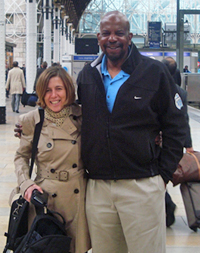 Last month, I had the honor to be asked to travel to London as part of an international review panel for the Wellcome Trust. The Trust is a worldwide charitable organization dedicated to achieving extraordinary improvements in human and animal health. It was great to be able to see the extraordinary research being performed by scientists in the UK.
Last month, I had the honor to be asked to travel to London as part of an international review panel for the Wellcome Trust. The Trust is a worldwide charitable organization dedicated to achieving extraordinary improvements in human and animal health. It was great to be able to see the extraordinary research being performed by scientists in the UK.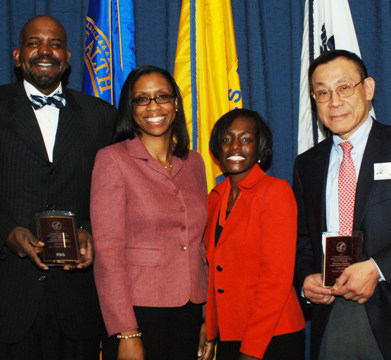 As many of you know, one of my missions is to help reduce or even eliminate the health disparities of underserved populations in the United States. Health disparities represent a major public health emergency in our country and eliminating them is a major challenge.
As many of you know, one of my missions is to help reduce or even eliminate the health disparities of underserved populations in the United States. Health disparities represent a major public health emergency in our country and eliminating them is a major challenge.